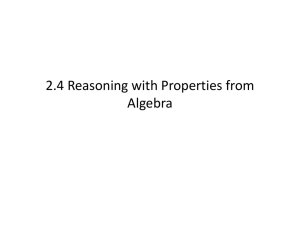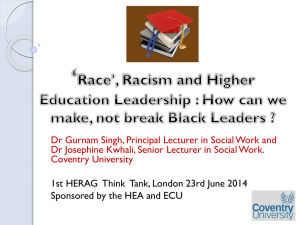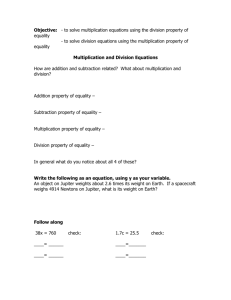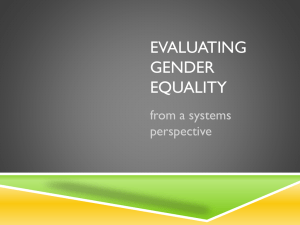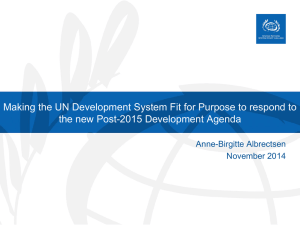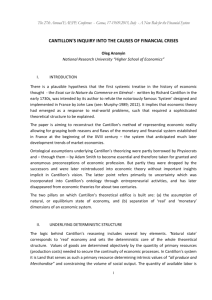Recommendations
advertisement
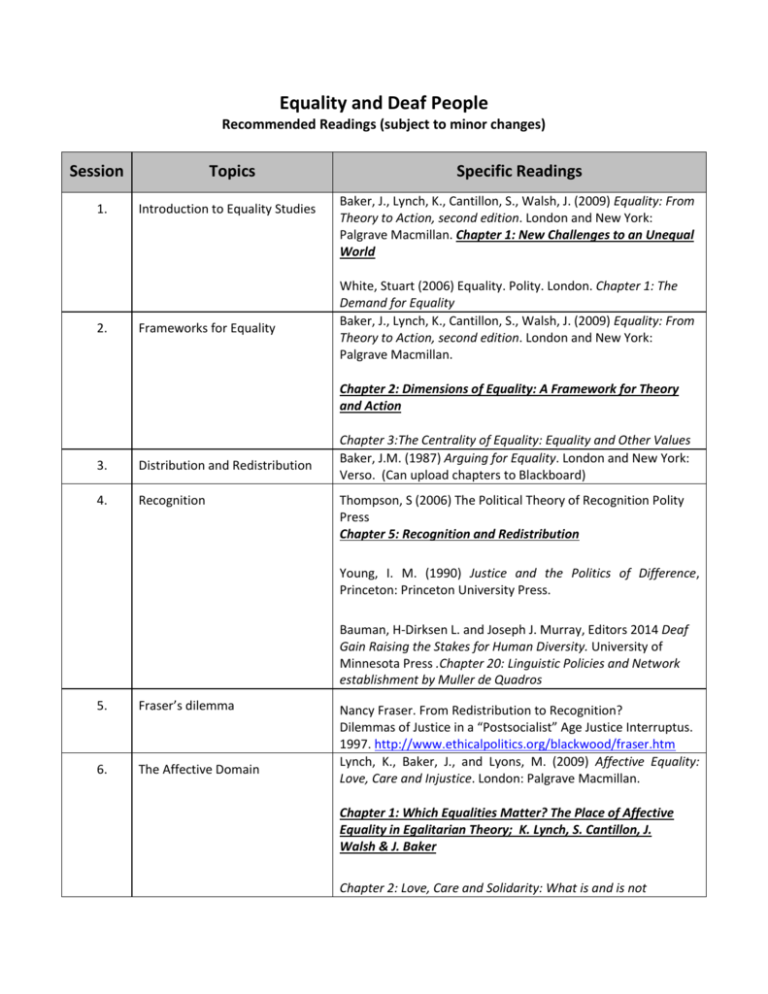
Equality and Deaf People Recommended Readings (subject to minor changes) Session 1. 2. Topics Introduction to Equality Studies Frameworks for Equality Specific Readings Baker, J., Lynch, K., Cantillon, S., Walsh, J. (2009) Equality: From Theory to Action, second edition. London and New York: Palgrave Macmillan. Chapter 1: New Challenges to an Unequal World White, Stuart (2006) Equality. Polity. London. Chapter 1: The Demand for Equality Baker, J., Lynch, K., Cantillon, S., Walsh, J. (2009) Equality: From Theory to Action, second edition. London and New York: Palgrave Macmillan. Chapter 2: Dimensions of Equality: A Framework for Theory and Action 3. Distribution and Redistribution 4. Recognition Chapter 3:The Centrality of Equality: Equality and Other Values Baker, J.M. (1987) Arguing for Equality. London and New York: Verso. (Can upload chapters to Blackboard) Thompson, S (2006) The Political Theory of Recognition Polity Press Chapter 5: Recognition and Redistribution Young, I. M. (1990) Justice and the Politics of Difference, Princeton: Princeton University Press. Bauman, H-Dirksen L. and Joseph J. Murray, Editors 2014 Deaf Gain Raising the Stakes for Human Diversity. University of Minnesota Press .Chapter 20: Linguistic Policies and Network establishment by Muller de Quadros 5. Fraser’s dilemma 6. The Affective Domain Nancy Fraser. From Redistribution to Recognition? Dilemmas of Justice in a “Postsocialist” Age Justice Interruptus. 1997. http://www.ethicalpolitics.org/blackwood/fraser.htm Lynch, K., Baker, J., and Lyons, M. (2009) Affective Equality: Love, Care and Injustice. London: Palgrave Macmillan. Chapter 1: Which Equalities Matter? The Place of Affective Equality in Egalitarian Theory; K. Lynch, S. Cantillon, J. Walsh & J. Baker Chapter 2: Love, Care and Solidarity: What is and is not Commodifiable; K. Lynch & J. Walsh Chapter 4: Care-Less Citizenship? Public Devaluation and Private Validation; K. Lynch & M. Lyons Bauman, H-Dirksen L. and Joseph J. Murray, Editors 2014 Deaf Gain Raising the Stakes for Human Diversity. University of Minnesota Press Chapter 4: Three Revolutions: Language, Culture and Biology 7. Language policies and equality Chapter 6: Deaf Gain in Studies of Bilingualism and Bilingual Education Wilcox, S., Krausneker, V., & Armstrong, D. 2012. Language Policies and the Deaf Community. In B. Spolsky (ed.) Cambridge Handbook of Language Policy, 374-395. Cambridge: Cambridge University Press. Reagan, T. 2006. Language Policy and Sign Languages. In T. Ricento, An Introduction to Language Policy. Theory and Method (pp. 329–345). Blackwell Publishing. Kusters, A., De Meulder, M., Friedner, M. & Emery, S. 2015. On “diversity” and “inclusion”: exploring paradigms for achieving Sign Language Peoples’ rights. MMG Working Paper 1502. Available at: http://www.mmg.mpg.de/publications/workingpapers/2015/wp-15-02/ 8. Strategy for equality Hill Collins, Patricia (2000) Black feminist thought: knowledge, consciousness, and the politics of empowerment. Routledge 2nd ed. Baker, J., Lynch, K., Cantillon, S., Walsh, J. (2009) Equality: From Theory to Action, second edition. London and New York: Palgrave Macmillan. PART III: STRATEGIES FOR CHANGE Class, Gender and the Equality Movement Ideology and Resistance Strategic Issues for the Equality Movement McDonnell, Pat (2000) ‘Deep Structures’ in Deaf Education: Implications for Policy, in L. Leeson (ed.) Looking Forward: EUD in the 3rd Millennium – the Deaf Citizen in the 21st Century.




